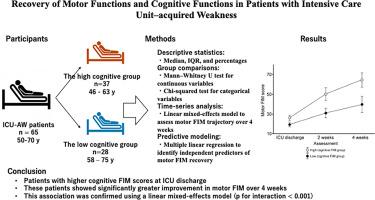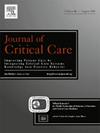Recovery of motor functions and cognitive functions in patients with intensive care unit–acquired weakness
IF 2.9
3区 医学
Q2 CRITICAL CARE MEDICINE
引用次数: 0
Abstract
Purpose
This study aimed to identify factors influencing recovery of activities of daily living (ADLs) in patients with ICU-acquired weakness (ICU-AW) after ICU discharge.
Methods
A retrospective cohort study was conducted with 65 ICU-AW patients. Data were collected from ICU discharge to four weeks post-discharge. Variables analyzed included age, sex, APACHE-II score, mechanical ventilation duration, and presence of delirium. The primary outcome was ADL recovery. Multiple regression analysis was performed using data at ICU discharge, and a linear mixed model assessed changes in motor Functional Independence Measure (FIM) scores.
Results
Median age was 61 years (IQR: 50–70), with females comprising 44.6 %. Median APACHE-II score was 25 (IQR: 20–29), and 69.2 % were surgical ICU patients. Median mechanical ventilation duration was 19 days (IQR: 10–34), and delirium lasted a median of three days (IQR: 1–7). Multivariable analysis showed cognitive FIM score at ICU discharge (β = 19.12, p = 0.001) and delirium duration (β = −9.83, p < 0.001) were independently associated with ADL recovery. The linear mixed model revealed a significant difference in motor FIM gain between patients with preserved cognition and those with cognitive dysfunction (p = 0.001).
Conclusions
Cognitive function at ICU discharge and delirium duration significantly predicted ADL recovery. These factors should be considered in post-ICU rehabilitation planning.

重症监护病房获得性虚弱患者运动功能和认知功能的恢复
目的探讨ICU获得性虚弱(ICU- aw)患者出院后日常生活活动(ADLs)恢复的影响因素。方法对65例ICU-AW患者进行回顾性队列研究。数据收集自ICU出院至出院后4周。分析的变量包括年龄、性别、APACHE-II评分、机械通气持续时间和谵妄的存在。主要观察指标为ADL恢复。使用ICU出院时的数据进行多元回归分析,并采用线性混合模型评估运动功能独立测量(FIM)评分的变化。结果中位年龄61岁(IQR: 50-70),女性占44.6%。APACHE-II评分中位数为25分(IQR: 20-29), 69.2%为外科ICU患者。机械通气时间中位数为19天(IQR: 10-34),谵妄持续时间中位数为3天(IQR: 1-7)。多变量分析显示,ICU出院时认知FIM评分(β = 19.12, p = 0.001)和谵妄持续时间(β = - 9.83, p < 0.001)与ADL恢复独立相关。线性混合模型显示,保留认知功能的患者和认知功能障碍患者的运动FIM增益有显著差异(p = 0.001)。结论ICU出院时认知功能和谵妄持续时间对ADL恢复有显著预测作用。在icu后康复规划中应考虑这些因素。
本文章由计算机程序翻译,如有差异,请以英文原文为准。
求助全文
约1分钟内获得全文
求助全文
来源期刊

Journal of critical care
医学-危重病医学
CiteScore
8.60
自引率
2.70%
发文量
237
审稿时长
23 days
期刊介绍:
The Journal of Critical Care, the official publication of the World Federation of Societies of Intensive and Critical Care Medicine (WFSICCM), is a leading international, peer-reviewed journal providing original research, review articles, tutorials, and invited articles for physicians and allied health professionals involved in treating the critically ill. The Journal aims to improve patient care by furthering understanding of health systems research and its integration into clinical practice.
The Journal will include articles which discuss:
All aspects of health services research in critical care
System based practice in anesthesiology, perioperative and critical care medicine
The interface between anesthesiology, critical care medicine and pain
Integrating intraoperative management in preparation for postoperative critical care management and recovery
Optimizing patient management, i.e., exploring the interface between evidence-based principles or clinical insight into management and care of complex patients
The team approach in the OR and ICU
System-based research
Medical ethics
Technology in medicine
Seminars discussing current, state of the art, and sometimes controversial topics in anesthesiology, critical care medicine, and professional education
Residency Education.
 求助内容:
求助内容: 应助结果提醒方式:
应助结果提醒方式:


